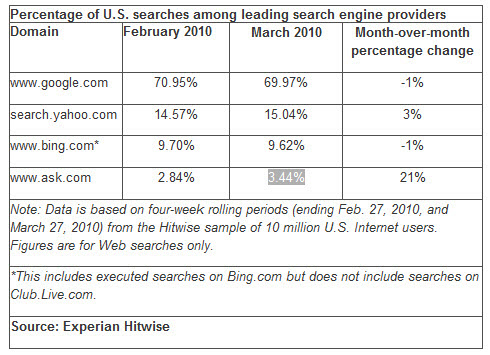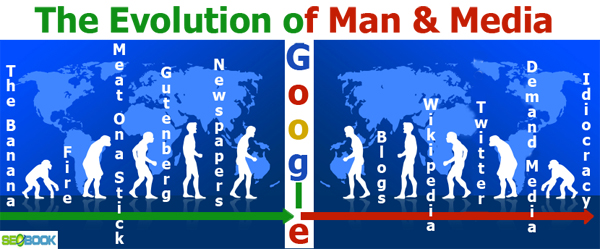Paid Content: the New Paid Link
Paid Links Are Spam
Buying links is considered spammy by Google because it is a ranking short cut which subverts search relevancy algorithms.
And so Google considers it a black hat SEO practice.
Links are somewhat hard to scale because (outside of those who create a network of spam) it is time intensive to find the right sites, negotiate a price, and then ensure appropriate placement. It requires interacting with many webmasters & going through a lot of rejections to get a few yes responses. Due to scale limitations, paid links typically only exert a slight influence on core industry keywords and common variations, limiting any potential relevancy damage.
Further, when a person buys a link, the relevancy is almost always guaranteed (as one would go broke fast if they rented links targeting irrelevant keywords).
Even still, Google hates paid links because they can lower result diversity & bias the organic search results away from being informational and towards being commercial (which in turn means that Google AdWords ads get fewer clicks).
Policing Paid Links
To make link building efforts easier to police, Google created nofollow, which aimed to disrupt the flow of link equity across certain links. Initially the alleged purpose was blocking comment spam. And then after it was in place, comment spam never went away, but the role of rel=nofollow quickly expanded to be a cure-all to be placed on any paid link.
Google encouraged spam reports that highlight paid links. SEO blogs highlighted people that were buying links. Firms like Text Link Ads were eradicated from the Google index. And all was well in GoogleLand.
...Until...
The Rise of Content Farms
Over the past few years people realized that Google had dialed up the weight on domain authority & that links are now much harder to get. So companies started placing lead generation forms on trusted sites & firms like Demand Media purchased highly trusted websites like eHow (which already had a ton of links in place from back when links were easier to obtain).
Demand Media then automated and streamlined the content production process and poured content into eHow until the rate of returns on new content and growth rate started to slow.
This type of strategy attacks the longtail of search, and given how many unique search queries there are each day, that amounts to a lot of opportunity!

Corporate Content Farming: The Art of Informationless Information
Anyone who has watched The Meatrix is likely afraid of factory farms. The content created by these content farms isn't much better. When I highlighted how bad one of the pieces was their solution was to delete it and hide it from site, then write a memo about how they do "quality" content at scale.
That scale part is no joke - Demand Media brought in over $200 million last year. And I suppose if they put the word "low" in front of quality, it wouldn't be a joke either.
Abusing Nofollow
These same authoritative websites which managed to create content for $10 to $15 a page (or sometimes $0 auto-generated pages) then leveraged nofollow on *all* outbound links, so that they would not vote for anyone, even if their content was only a thin watered down rewrite of 3rd party content sources:
eHow is a content publisher known for “How To..” articles. Lately, it seems eHow visits other websites, scrapes their instructional content (on whatever topic), and republishes it as a How To article on eHow. Sometimes the entire step-by-step process is “copied” for the eHow article. I’ve noticed a few times this week, how eHow articles are basically copies of existing content from other sites, worse than Wikipedia rewrites. That’s pretty much “scraping”, even if done by poorly-paid human workers.
So now companies are building a wide range of "content" business models ranging from auto-generated content to semi-autogenerated mash-ups to poorly crafted manual rewrites (as mentioned above).
Content Scraping & Recycling as a Legitimate Business?
Even search engines are becoming general purpose scrapers, snagging third party content, mixing it together, wrapping it in ads, and pushing it into the index of other search engines.
The result?
Ask.com's share of search traffic rose 21% last month alone!

The Information Age
We are no longer in an “Information Age.” We are in the Age of Noise. Falsehoods, half-truths, talking points, out-of-context video edits, plagiarism, rewriting of history (U.S. was founded as a Christian nation, for example), flip-flops, ignoring facts (Cheney and torture for example), neatly packaged code words and phrases, media ratings focus, dysfunctional government (fillibusters have more than doubled, but most don’t realize Republicans are blocking everything), mainstreaming fringe causes….I could go on and on. Is it any wonder why so many who are struggling with kids, jobs, rising medical costs, etcetera have such a tough time wading through all the crap? - source
Paranoid About Links
As building up your own profile has grown harder (since links are harder to get) many new web 2.0 websites provide free outbound links to help encourage participation and get links back into their websites. But then after they reach a critical mass they claim that spam is an issue and strip away the links by using nofollow, stealing that hard work people did to build up the network, offering nothing in return for it!
Google's fear of links is *so out of hand* that an SEO simply mentioning that a person can get a link from their own profile page on a social site is enough to have Matt Cutts go out of his way to push the social media site to remove the opportunity. If you put a lot of work building up a social profile Google doesn't want you to benefit from that work, but it is fine if that network does:
If Google is the one who wants that web link nofollowed because some twitter profile pages may be automated bots or spammers, then it is time they realize that THEY are responsible for determining which of those individual pages is authoritative, trusted and legitimate enough to pass link popularity, by a method other than demanding that other websites and social networks change the ways they do business to help Google stop links being used as a form of currency and to manipulate their algorithm – an issue Google and Google alone created and profited from.
Any Form of Payment = Not Trustworthy
A few years back a well known SEO joined our training program, read our tip about using self-hosted affiliate programs as a link building tool, and then promptly outed us directly to Matt Cutts, in a video, and on their blog. Google quickly blocked our affiliate program from passing link juice. Later a Google engineer publicly stated affiliate links should count.
Since then affiliate links have been a gray area (it works for some companies and doesn't work for others, based on 100% arbitrary choices inside Google). Looking for clarification on the issue, Eric Enge recently asked Matt Cutts: "If Googlebot sees an affiliate link out there, does it treat that link as an endorsement or an ad?"
Matt Cutts responded with: "Typically, we want to handle those sorts of links appropriately. A lot of the time, that means that the link is essentially driving people for money, so we usually would not count those as an endorsement."
So links which are driven by payment should not count as endorsements, even if the affiliate does endorse & believe in the product. The fact that there is a monetary relationship there means the link *should not count*
The Elephant in the Room at the GooglePlex
Ignoring links for a moment, lets get back to the the content mill content business model. It was fine that Demand Media bought trusted (well linked) sites like eHow for their trust to pour low-end content into, even though those pre-existing links were bought by the new owner.
And here is where the content mill business model gets really shady, in terms of "what is good for the user" ... Demand Media is now licensing backfill content to be hosted on USAToday.com on a revenue share basis. Describing the relationship, Dave Panos, Demand Media's CMO said "It's an opportunity for us to get in front of the audience that's already congregating around very well-known brands."
But you won't find that content on the USAToday.com homepage.
When he said "already congregating around very well-known brands" what he meant was "will rank well on Google." And so, what we have is a paid content partnership which subverts search relevancy algorithms.
If affiliate links shouldn't count, then why would affiliate content?
If Google doesn't stop it from day 1 then the media companies are going to quickly become addicted to the risk-free money like crack. And if Google tries to stop it *after* it is in place then they are going to find themselves lambasted in the media with talks of anti-trust concerns.
Something to think about before heading too far down that path.
Two Roads Diverged in a Wood...
How is a content exchange network any different than a link exchange network? The intent is exactly the same, even if the mechanics and payment terms differ slightly.
If a paid link that subverts search relevancy algorithms shouldn't count on the web graph, then why should Google trust paid content that subverts search relevancy algorithms?
Will the search results start filling up with similar sounding misinformed content ranking for 1 then 3 then 8 of the top 10 search results? Do the search results slowly get dumbed down 1 article and 1 topic at a time?

This trend *will* harm both the accuracy and diversity of content ranking in the search results. And it will grow progressively worse as people begin to quote the misinformed garbage on other websites (because hey, if it ranks in Google and is on USA Today it is *probably* true). Or is it?
Some questions worth thinking about:
- Google is willing to truth police SEOs. Will they do the same for media outlets publishing backfill "content"?
- How will Google be able to filter out the Demand Media content without filtering out the rest of the media sites?
- Does Google care if the quality & diversity of the search results is diminished, even if/when most searchers will not be savvy enough to recognize it? I guess it depends on who has the last word on the issues inside Google, because most garbitrage content is wrapped in AdSense ads.
New to the site? Join for Free and get over $300 of free SEO software.



Once you set up your free account you can comment on our blog, and you are eligible to receive our search engine success SEO newsletter.
Already have an account? Login to share your opinions.
New to the site? Join for Free and get over $300 of free SEO software.



Once you set up your free account you can comment on our blog, and you are eligible to receive our search engine success SEO newsletter.
Already have an account? Login to share your opinions.




Comments
I think this is an important discussion that needs to happen across the web, so I am turning comments off on this post for now because I would love to see people write about this topic on their own websites and blogs and whatnot.
It is an important topic, and it deserves far more exposure than any one site can provide.
After a few days I will likely edit the above post to link up some of the most interesting discussion and points of view I see around the web. :D